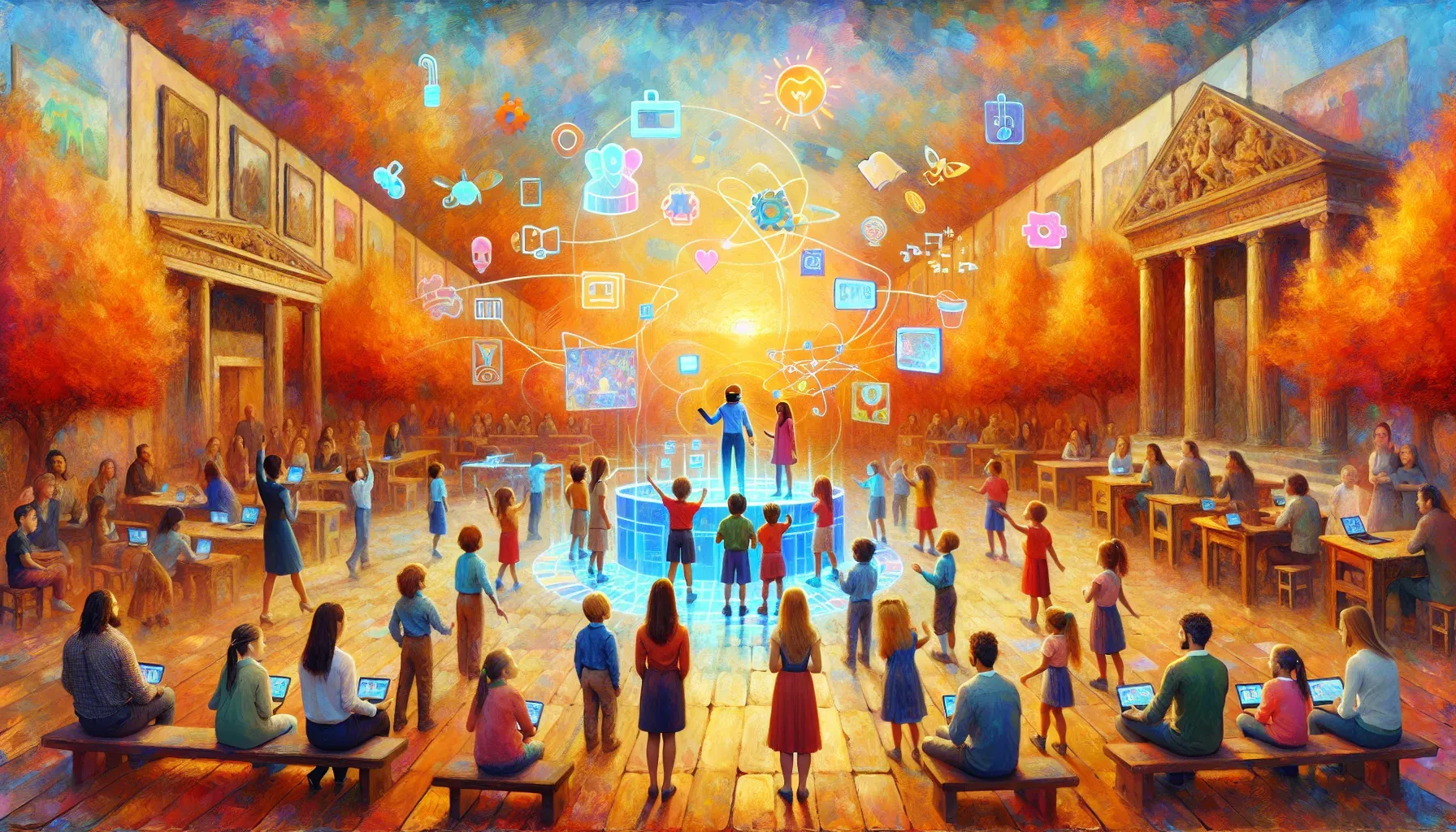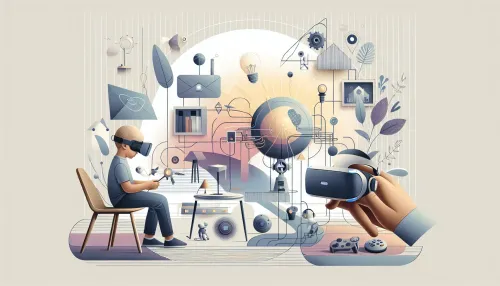Embracing Augmented Reality: A New Dimension in Autism Education

In recent years, the integration of augmented reality (AR) in education has garnered significant attention for its potential to revolutionize learning experiences, particularly for children with autism spectrum disorder (ASD). This cutting-edge technology has opened new avenues for creating interactive and engaging educational tools that cater to the unique needs of autistic children. Let's delve into the transformative impact of augmented reality in autism education and explore its multifaceted advantages.
Augmented reality, a technology that overlays digital content onto the real world, has emerged as a powerful tool for creating immersive and interactive learning environments. For autistic children, who often thrive in visually stimulating and structured settings, AR offers a dynamic way to engage with educational content. By superimposing virtual elements onto the physical environment, AR applications can bring abstract concepts to life, making complex ideas more tangible and comprehensible for children on the autism spectrum.
How Augmented Reality Transforms Learning for Autistic Children
It's essential to recognize the immense potential of AR in catering to the specific learning preferences of autistic children. By leveraging this innovative technology, educators and parents can provide tailored instructional materials and interactive experiences that accommodate the diverse learning styles and sensory sensitivities commonly associated with autism.
One of the hallmark challenges faced by many autistic children revolves around social interaction and communication. Augmented reality holds promise in addressing these areas by offering opportunities for practicing social scenarios in a controlled and supportive manner. Through AR-based simulations, children can engage in virtual interactions, explore facial expressions, and navigate social cues within a safe and adjustable environment.
Developing Social and Communication Skills with AR
As an advocate for inclusive education, HorizonsMind emphasizes the significance of leveraging AR as a tool for nurturing essential social and communication skills in autistic children. By simulating real-world social scenarios and providing immediate feedback, AR applications can help build confidence and competence in navigating social interactions—a critical aspect of holistic development for children on the autism spectrum.
The successful integration of augmented reality in special education settings has yielded promising results, demonstrating the tangible benefits of this technology in supporting the learning objectives of students with autism. Notable case studies have showcased how AR-enhanced educational content can promote active participation, increase motivation, and improve comprehension among autistic learners. These initiatives have not only enhanced academic engagement but have also contributed to fostering a more inclusive and accessible learning environment.
Acknowledging the pivotal role of such case studies in highlighting the practical outcomes of incorporating augmented reality into special education classrooms. By showcasing real-world implementations and outcomes, these success stories serve as inspiring benchmarks for educators, parents, and policymakers seeking to leverage AR technologies to enhance the educational journey of autistic students.
Related Article: Wearable Tech Advancements: Empowering Autistic Children with Innovative Therapeutic Interventions
Case Studies: AR in Special Education Classrooms
Industry experts and professionals specialized in autism education emphasize that cognitive development is significantly influenced by immersive and multisensory learning experiences. Augmented reality aligns with this principle by offering a dynamic platform for delivering personalized and interactive educational content tailored to the specific cognitive needs of autistic children. By combining visual, auditory, and kinesthetic elements, AR can reinforce learning concepts while catering to individual cognitive strengths.
HorizonsMind values expert insights that underscore the role of augmented reality as a catalyst for optimizing cognitive development among autistic children. By incorporating expert perspectives into its advocacy for AR-integrated educational approaches, HorizonsMind reinforces its commitment to promoting innovative solutions that advance cognitive growth and academic empowerment within the autism community.
Expert Insights on AR's Role in Cognitive Development
As parental involvement is integral to supporting a child's educational journey, HorizonsMind recognizes the need to equip parents with practical guidance on integrating augmented reality into their child's daily learning routines. Through informative resources and step-by-step tutorials, parents can gain insights into selecting appropriate AR applications, creating interactive learning experiences at home, and leveraging AR tools to reinforce academic concepts in a familiar setting.
Our aims to empower parents with valuable resources to facilitate their active engagement in their child's education while harnessing the benefits of augmented reality. By providing a comprehensive guide tailored for home-based implementation, HorizonsMind endeavors to support parents in leveraging technology to augment their child's learning experiences effectively.
A Parent's Guide to Using AR in Daily Learning
Despite its transformative potential, integrating augmented reality into autism education necessitates a thoughtful approach that addresses accessibility concerns and mitigates sensory overload risks. Emphasizing the importance of ensuring that AR applications are designed with features that accommodate diverse sensory profiles and individualized learning needs among autistic children. By prioritizing inclusivity and usability considerations, AR developers can create user-friendly experiences that cater to varying sensory sensitivities.
Collaborative partnerships between educational technology (EdTech) companies and autism support groups play a pivotal role in driving innovation within the realm of AR-based educational solutions for autistic children. By fostering synergistic relationships between technology developers, educators, therapists, and autism advocates, these collaborations contribute to the design and refinement of AR applications that align with the specific requirements of the autism community.
Navigating Challenges: Accessibility and Sensory Overload
Evaluating the enduring effects of augmented reality platforms on the educational trajectories of autistic children is essential for gauging their overall efficacy. Through longitudinal studies and comprehensive assessments, researchers can gain insights into how AR interventions influence academic performance, skill acquisition, and overall well-being among students on the autism spectrum.
In addition to its role in formal education settings, augmented reality holds promise as a valuable tool within therapeutic interventions for autistic children. From aiding in sensory integration activities to facilitating social skills training, AR applications have demonstrated potential benefits in augmenting therapeutic practices focused on enhancing developmental outcomes for individuals with ASD. The immersive nature of augmented reality presents opportunities to create engaging therapeutic environments that resonate with the sensory preferences and therapeutic goals of autistic individuals.
Related Article: Adaptive Technologies in Autism Care: Innovations from Urban Centers
Collaborations Between EdTech and Autism Support Groups
As an advocate for holistic support across various domains pertinent to autism intervention, HorizonsMind acknowledges the broad-reaching impact of augmented reality beyond traditional classroom settings. By exploring innovative applications of AR within therapeutic contexts, HorizonsMind underscores its commitment to advancing comprehensive approaches aimed at maximizing developmental potential among individuals on the autism spectrum.
Frequently Asked Questions
Augmented reality (AR) overlays digital content onto the real world, creating immersive learning experiences. For autistic children, AR can transform abstract concepts into tangible ideas, enhancing engagement and comprehension in educational settings. This technology caters to their unique learning preferences, making it easier for them to interact with educational materials.
Augmented reality can aid in developing social skills by providing controlled simulations of social interactions. Through AR applications, children can practice navigating social cues and facial expressions in a safe environment. This interactive approach helps build confidence and competence in social situations, which is essential for their overall development.
Successful case studies have demonstrated the effective integration of AR tools in special education classrooms. These tools have shown to enhance student participation, motivation, and comprehension among autistic learners. By providing engaging content tailored to their needs, AR fosters a more inclusive learning environment that supports academic success.
Experts emphasize that augmented reality significantly enhances cognitive development through immersive learning experiences. By combining visual, auditory, and kinesthetic elements, AR caters to the specific cognitive needs of autistic children. This personalized approach reinforces learning concepts and supports individual strengths, promoting better educational outcomes.
Parents can integrate augmented reality into daily routines by selecting appropriate AR applications and creating interactive learning experiences at home. Step-by-step tutorials and resources can guide parents in leveraging AR tools to reinforce academic concepts in familiar settings, enhancing their child's engagement and understanding of various subjects.
Integrating augmented reality into autism education presents challenges such as ensuring accessibility and minimizing sensory overload. It's crucial for developers to design AR applications that accommodate diverse sensory profiles and individual learning needs. Prioritizing inclusivity helps create user-friendly experiences that cater to varying sensitivities among autistic children.
Collaborations between EdTech companies and autism support groups drive innovation in AR-based educational solutions. These partnerships foster relationships among technology developers, educators, therapists, and advocates, ensuring that AR applications meet the specific requirements of the autism community. Such teamwork enhances the effectiveness of educational tools for autistic children.
The long-term impact of augmented reality on autistic children's education is assessed through longitudinal studies that evaluate academic performance and skill acquisition. Research aims to understand how AR interventions influence overall well-being among students on the autism spectrum, providing insights into their educational trajectories over time.
Augmented reality serves as a valuable tool in therapeutic interventions for autistic children by facilitating sensory integration activities and social skills training. Its immersive nature creates engaging therapeutic environments that align with sensory preferences and developmental goals, enhancing the effectiveness of therapies aimed at improving outcomes for individuals with ASD.
Check Out These Related Articles

Data-Driven Parenting: Leveraging Technology for Informed Decision-Making in Autism Care

Robotic Innovations Transcending Autism Support: Redefining Social Interaction and Skill Development

Navigating Ethical Frontiers: Balancing Technological Advancements and Moral Responsibility in Autism Support
